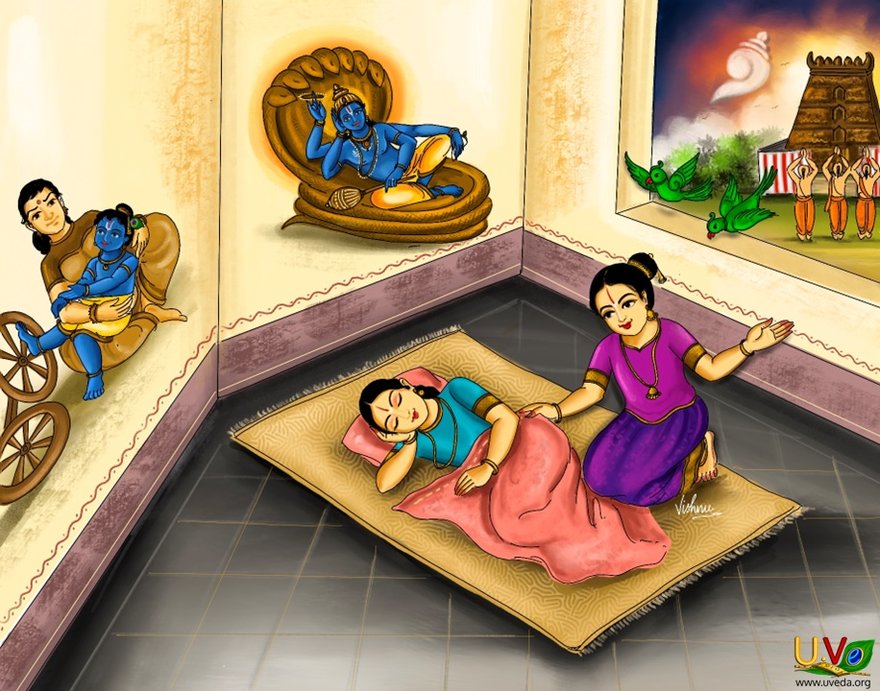TP 1.6
The Great Sound of "Hari" Resounds Everywhere
அரி என்று எங்கும் பேரொலி

479 புள்ளும் சிலம்பினகாண் புள்ளரையன் கோயிலின் *
வெள்ளைவிளிசங்கின் பேரரவம்கேட்டிலையோ? *
பிள்ளாய்! எழுந்திராய் பேய்முலைநஞ்சுண்டு *
கள்ளச்சகடம் கலக்கழியக்காலோச்சி *
வெள்ளத்தரவில் துயிலமர்ந்தவித்தினை *
உள்ளத்துக்கொண்டு முனிவர்களும்யோகிகளும் *
மெள்ளவெழுந்து அரியென்றபேரரவம் *
உள்ளம்புகுந்து குளிர்ந்தேலோரெம்பாவாய்.
வெள்ளைவிளிசங்கின் பேரரவம்கேட்டிலையோ? *
பிள்ளாய்! எழுந்திராய் பேய்முலைநஞ்சுண்டு *
கள்ளச்சகடம் கலக்கழியக்காலோச்சி *
வெள்ளத்தரவில் துயிலமர்ந்தவித்தினை *
உள்ளத்துக்கொண்டு முனிவர்களும்யோகிகளும் *
மெள்ளவெழுந்து அரியென்றபேரரவம் *
உள்ளம்புகுந்து குளிர்ந்தேலோரெம்பாவாய்.
TP.1.6
479 pul̤l̤um cilampiṉa kāṇ * pul̤-araiyaṉ koyiliṉ *
vĕl̤l̤ai vil̤i caṅkiṉ per-aravam keṭṭilaiyo? *
pil̤l̤āy ĕḻuntirāy peymulai nañcu uṇṭu *
kal̤l̤ac cakaṭam kalakku aḻiyak kāl occi **
vĕl̤l̤attu araviṟ * tuyil amarnta vittiṉai *
ul̤l̤attuk kŏṇṭu muṉivarkal̤um yokikal̤um *
mĕl̤l̤a ĕḻuntu ari ĕṉṟa per-aravam *
ul̤l̤am pukuntu kul̤irntu-elor ĕmpāvāy (6)
vĕl̤l̤ai vil̤i caṅkiṉ per-aravam keṭṭilaiyo? *
pil̤l̤āy ĕḻuntirāy peymulai nañcu uṇṭu *
kal̤l̤ac cakaṭam kalakku aḻiyak kāl occi **
vĕl̤l̤attu araviṟ * tuyil amarnta vittiṉai *
ul̤l̤attuk kŏṇṭu muṉivarkal̤um yokikal̤um *
mĕl̤l̤a ĕḻuntu ari ĕṉṟa per-aravam *
ul̤l̤am pukuntu kul̤irntu-elor ĕmpāvāy (6)
Ragam
Būpāḷa / பூபாள
Thalam
Ādi / ஆதி
Bhavam
Nāyaki (lovelorn lady)
Reference Scriptures
BG. 10-9
Simple Translation
479. See, the birds are chirping.
Don't you hear the loud blowing of the white conch
from the temple of the God who rides on Garudā?
O friend, wake up.
He drank the poison from Putanā's breasts and destroyed
the cheating Sakatāsuran,
He is the primordial force who gently rests on the ocean on the
snake Adishesha.
Sages and yogis rise and praise him saying, “Hari, Hari!”
Listen to their praise. Let the chant enter and cool your hearts
Come, let us go and worship our Pāvai.
Velukkudi Sri. U. Ve. Krishnan Swami’s Upanyasam
TP.1.6
Word by Word (WBW) meaning
(The words may be rearranged to facilitate conversion from poetry to prose (Aṉvayam). Please read the meanings (in black) continuously to form the sentence and understand the simplified meaning based on the Divyārtha Dīpikai for the verse.)
புள்ளும் — பறவைகளும்; சிலம்பின — ஆரவாரங்கள்; காண் — செய்யநின்றன காண்!; புள்ளரையன் — பறவைத் தலைவனான கருடனுக்கு; கோயில் — எம்பெருமானின் ஸந்நிதியிலே; வெள்ளை — வெண்மையான; விளிசங்கின் — விளித்து அழைக்கும் சங்கினுடைய; பேரரவம் — பேரொலியையும்; கேட்டிலையோ? — கேட்கவில்லையோ?; பிள்ளாய்! — பெண்ணே!; எழுந்திராய் — சீக்கிரமாக எழுந்திரு; பேய்முலை — பூதனையிடம்; நஞ்சுண்டு — விஷத்தை உண்டு; கள்ளச் — வஞ்சனை பொருந்திய; சகடம் — சகடாசுரனை; கலக்கு அழிய — கட்டுக் குலைந்திட; கால் ஓச்சி — காலால் உதைத்திட்ட; வெள்ளத்து — திருப்பாற்கடலில்; அரவில் — ஆதிசேஷன் மீது; துயில் அமர்ந்த — நித்திரை கொள்ளும்; வித்தினை — பெருமானை; முனிவர்களும் — ரிஷிகளும்; யோகிகளும் — யோகிகளும்; உள்ளத்து — மனதில்; கொண்டு — தியானித்துக் கொண்டு; மெள்ள எழுந்து — மெள்ள எழுந்து; அரி என்ற — ஹரி என்ற; பேர் அரவம் — பேரொலி; உள்ளம் புகுந்து — நெஞ்சில் புகுந்து; குளிர்ந்து — குளிர்ந்தது; ஏலோர் எம்பாவாய் — பெண்களே பாவை நோன்பு நோற்க வாரீர்!
pul̤l̤um silambina-kāṇ — birds are calling while going (after waking up), and; kĕttilaiyŏ — are you not hearing; pĕr-aravam — the big sound; vel̤l̤ai vil̤i-sangin — of white conch which is doing thirupal̤l̤i-ezhuchchi (waking up emperumān); pul̤l̤araiyan koyilil — in the temple of perumān who is garudans leader, [garudan who is the head of birds]; pil̤l̤āi — you young gŏpikā who is new to bhagavath vishayam,; ezhundhirāi — get rid of sleep and get up;; munivargal̤um — adiyārs who meditate him; yŏgigal̤um — and adiyārs who do yogābhyāsam; mel̤l̤a ezhundhu — (they) get up slowly without disturbing the emperumān in their hearts; ul̤l̤aththu koṇdu — they have placed in their hearts through thoughts about; pĕi mulai nanju-uṇdu — perumān who drank phūthanais poisonous milk from her nipples, (and killed her),; kal̤l̤ach chakatam — (who made the) the cunning cart; kalakku azhiya — go out of shape and get destroyed; kāl ŏchchi — by kicking with thiruvadi (and finish it),; thuyil amarndha — (who is) gracefully lying down; vel̤l̤aththu — in the liquid of milky ocean; aravil — on thiruvananthāzhvān (ādhi ṣĕshan); viththinai — one who is root of the world; ari enṛa pĕr aravam — (munis and yŏgis are thinking about such emperumān and) making big sound, chanting hari;; ul̤l̤am pugundhu kul̤irndhu — (please get up so that) we get that sound into our minds and become happy.
Detailed Explanation
The first Gopikā whom Āṇḍāḷ awakens in this pāsuram is unacquainted with Bhagavath Viṣayam (matters related to Perumāṇ's service) and lacks knowledge about conducting the nōṉbu.
In the initial quartet of pāsurams, Āṇḍāḷ elucidated upon para, vyūha, vibhava, and antaryāmitva. The fifth deviated from this pattern; in this sixth pāsuram, the Āḷvārs celebrate the archāvatāram,